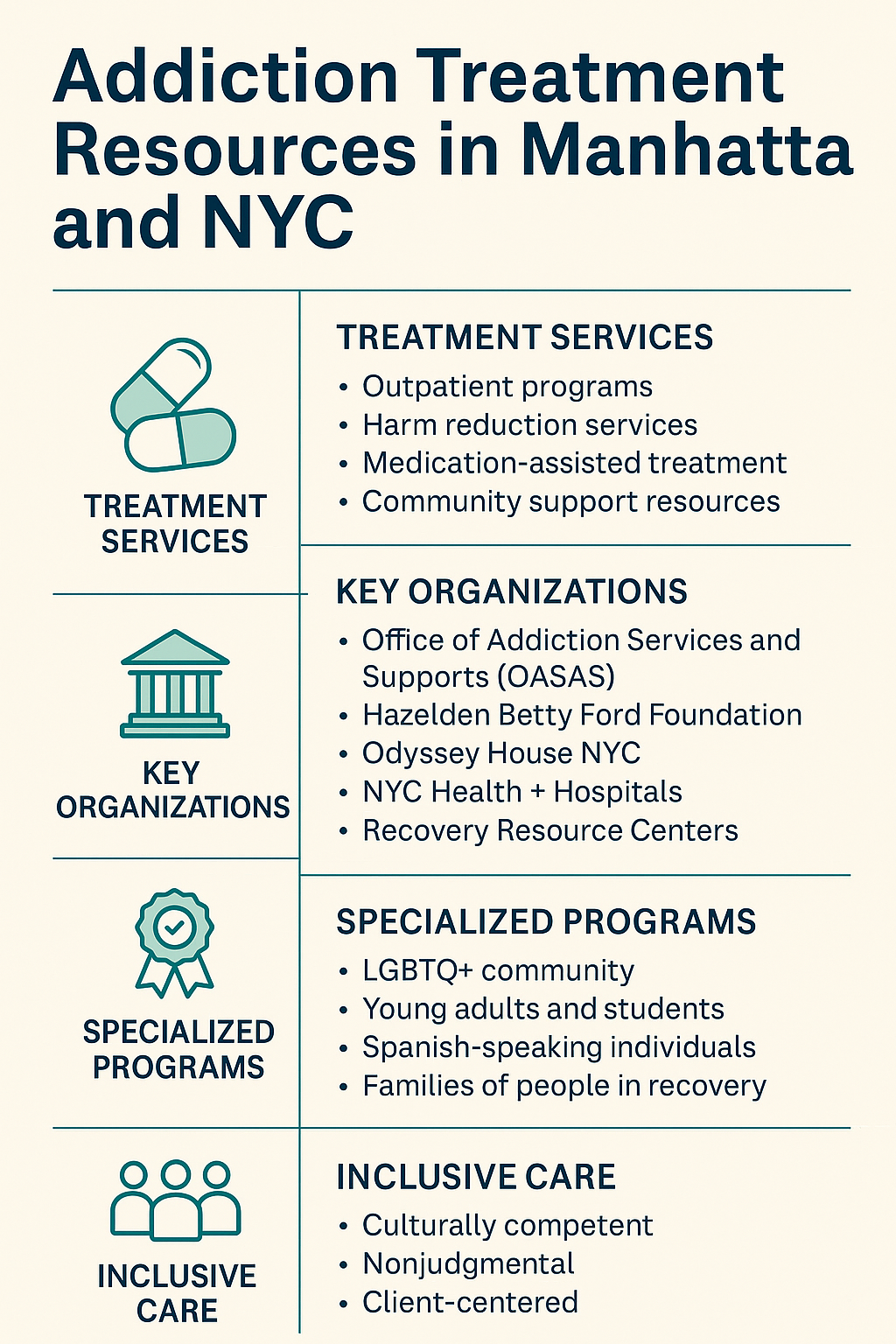Addiction Treatment Resources in Manhattan and NYC
New York City offers diverse addiction treatment options — from outpatient programs to community recovery centers — helping residents achieve lasting recovery.

Finding the Right Help in the City That Never Sleeps
In a city as fast-paced and diverse as New York, addiction treatment isn’t one-size-fits-all. Between the constant movement, career pressures, and the cultural mix of Manhattan, finding the right support can feel overwhelming — but recovery here is absolutely possible. New York City offers some of the nation’s most advanced outpatient programs, detox centers, and community-based recovery resources, all designed to meet people where they are in their journey.
Understanding Addiction Treatment in Manhattan
Addiction is both a medical and behavioral condition, and Manhattan treatment centers approach it through evidence-based care. Many programs use a holistic model — combining medical detox, therapy, medication-assisted treatment (MAT), and ongoing recovery support.
Reputable institutions such as Mount Sinai Behavioral Health, NewYork-Presbyterian, and Odyssey House NYC provide specialized care for substance use and co-occurring disorders, ensuring treatment plans are tailored to each client’s unique situation.
For those managing both mental health and addiction challenges, dual-diagnosis programs integrate therapy for depression, anxiety, trauma, and PTSD — issues that often accompany substance use.

Outpatient and Community-Based Treatment Options
Not everyone requires residential rehab. For working professionals, students, or parents, outpatient treatment programs in Manhattan and the surrounding boroughs allow flexibility while still maintaining structured recovery.
Programs like Spring Hill Wellness, Wholeview NYC, and the New York Center for Living offer Intensive Outpatient Programs (IOP) that balance therapy, support groups, and medication management.
Community-based resources — including OASAS-approved facilities and Overdose Prevention Centers — also provide accessible care. These locations distribute naloxone, fentanyl test strips, and harm-reduction tools that save lives while connecting individuals to longer-term recovery options.
Key Organizations Supporting Recovery in NYC
Several key organizations play a vital role in supporting addiction recovery across New York City, offering a mix of clinical care, housing, education, and peer support. The Office of Addiction Services and Supports (OASAS) oversees all licensed treatment providers throughout New York State, ensuring that facilities meet professional standards and provide evidence-based care. The Hazelden Betty Ford Foundation offers both in-person outpatient services and virtual addiction treatment programs, giving clients flexibility and accessibility.
Odyssey House NYC focuses on providing comprehensive care that includes housing, detox services, and structured outpatient rehabilitation — helping clients rebuild stability and independence. Meanwhile, NYC Health + Hospitals delivers public addiction and harm reduction services for New Yorkers of all income levels, promoting accessibility and equity in care.
Specialized Support for Diverse Communities
New York City’s diversity is one of its greatest strengths — and that same spirit of inclusion extends to the city’s addiction treatment programs. Across the boroughs, there are culturally competent centers that recognize the unique needs of each individual and community. Many facilities offer specialized support for the LGBTQ+ community, providing gender-affirming and trauma-informed care that fosters safety and trust.
There are also programs tailored for youth and young adults who are working to balance recovery with education or early career goals, as well as services for Spanish-speaking individuals through bilingual counseling and peer support groups. For families, dedicated programs help parents and loved ones learn how to offer encouragement and structure without enabling old habits.
Facilities such as Spring Hill Wellness in Manhattan, Mount Sinai West, and New York Pathways lead by example — emphasizing inclusive, nonjudgmental care that meets every client exactly where they are on their path to recovery.
Taking the First Step Toward Recovery
Whether you’re seeking help for yourself or someone you love, the first step is connection. Reach out to a licensed addiction counselor, attend a support group, or contact OASAS to find approved facilities in your neighborhood.
Recovery doesn’t happen overnight — but with the right treatment program, professional guidance, and community support, long-term sobriety and wellness are absolutely achievable here in New York City.
If you or someone you know is struggling, Spring Hill Wellness in Manhattan offers outpatient addiction treatment, DWI assessments, and family therapy programs designed for sustainable recovery and emotional healing.



